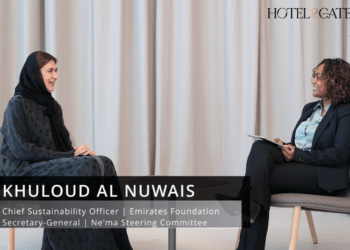Gender imbalance in the workplace is rarely discussed in the wider context of men, or its impact on teams. But how, if at all, can gender balance in senior management influence team performance? Melanie Mingas meets Liana Bagworth, managing partner of Dynamic Learning, to find out.

There are plenty of women going through hospitality school, yet far fewer women than men in the upper echelons of hospitality management. While the usual debates focus on pay disparity, gender-based discrimination and glass ceilings, they rarely include discussion on the impact of this on men and, more importantly the team as a whole, from entry level through to management.
In the great gender debate the economics are well versed, but the potential psychological effect of an unbalanced senior management team on entry to mid-level staff, and even a business’s performance, is often overlooked.
“An employee, at any level in the organisation with self awareness of their behaviours and therefore their impact on others, is exercising emotional intelligence,” explains Liana Bagworth, managing partner of Dynamic Learning.
“If I have a senior leadership team which is predominantly male or female, whether or not those team members themselves have any awareness of their impact on people, is absolutely going to impact me, my experience and the way in which I exercise my emotional intelligence,” she continues.
Emotional intelligence, or EQ, is a term believed to have first been coined in 1990 by Peter Salovey and John D. Mayer, who described it as a “form of social intelligence that involves the ability to monitor one’s own and others’ feelings and emotions, to discriminate among them, and to use this information to guide one’s thinking and action”.
This was picked up by then New York Times science writer Daniel Goleman, a Harvard trained psychologist, who argued that it’s not only IQ that guarantees business success but EQ. He described emotionally intelligent people as those with four characteristics: self-awareness; self-management; social awareness; and social skills.
Today the concept is widely accepted and built into training and management courses around the world. It’s of particular interest to the hospitality industry due to the nature of work, high level of customer engagement and demands of the business.
Dynamic Learning’s partner company Six Seconds produced a report looking at a three year view of global EQ trends. Findings about how EQ skills differ between women and men, are staggering (see graphic).
Women and men had such varied results that not only do they have completely opposite strengths and weaknesses, they have no shared skills and men have an average EQ score slightly higher than that of women.
“It is a complete mirror opposite. One’s EQ strengths are are the other’s weaknesses, which is why it is important to balance a management team. Neither gender has the full strength of a balanced EQ skill set to be optimally successful as a powerful leader.,” Bagworth explains.
Balancing the equation
EQ isn’t just about how well we keep our emotions in check, but how well we understand ourselves. Through self-awareness of our behaviour patterns, it can be used to predict reactions and behaviours, based on the understanding of the power and energy behind certain emotions. Taking it a step further, our self-awareness allows us to see emotions and patterns of behaviours in others. This ability to empathise with others allows us to choose appropriate responses to any situation.
Bagworth continues: “Men actually have a stronger ability to navigate emotions than women. This may or may not be productive though. Experiences associated with a strong emotional attachment are more likely to be committed to our long term memory, and are more easily retrieved from storage when the neural pathway is engaged again. That emotional attachment could produce productive or unproductive responses.
“If you have a balance of men and women on a team, it doesn’t ‘neutralise’ strengths and weaknesses, but it does offer the possibility of having a diverse, balanced and strong team. We know this balance is important for navigating through the highs and lows of leading, maintaining the energy and drive to stay focused on the goals and engage others. Engaged employees, at all levels, move much more powerfully through implementing changes. This is the power of emotional intelligence.”
What is interesting, is that the average intrinsic motivation (IM) score for women is lower than it is for men and, according to Bagworth, what this could imply is women are drawing energy from external factors, i.e. recognition and, to speculate a reason this could be because women still feel the need to establish themselves.
The impact is thus: “If women are not applying EQ skills during this they are perceived as people who are out for themselves, and in that case they will not have people following them, which isn’t good for leadership,” she explains.
Extrinsic impacts
It needs to be acknowledged that women aren’t spoken to in the same way as men and that begins at an early age. In the face of a life time of limiting language and even more limiting role models, it is thought this is the most harmful extrinsic impact of all.
Last year Michelle Ryan, a professor of social and organisational psychology at the University of Exeter in the UK, delivered a lecture at the Australian National University in Canberra, during which she claimed women’s ambition erodes over time for these very reasons.
“If you do surveys and about the proportion of men and women aiming for the top, you can see differences in their levels of ambition. But they don’t start off that way,” Ryan told Guardian Australia at the time.
“We’ve done the surveys for numerous professions, and whether it’s police officers, surgical trainees, or women in science, men and women have absolutely equal levels of ambition and want to make it to the top in equal numbers.
“But while men’s ambition increases over time, women’s decreases. My research suggests that this drop is not associated with wanting to have kids, or to stay home and look after them. It’s related to not having support, mentors or role models to make it to the top, and the subtle biases against women that lead to their choices,” added Ryan, whose “glass cliff” was named by the New York Times as one of the top 100 ideas that shaped 2008.
Framed in the context of the hospitality industry, it’s an interesting consideration. While many women are open in discussing their career path and achievements in this context, at least one prominent woman is not: Jennifer Fox.
When Fox was promoted to newly created role of president at Fairmont Raffles Hotels International, she was not only granted the corner office at a company positioning itself as the “leading hospitality brand globally” but she became one of the few female business leaders in the industry.
What she has done for both the FRHI brand and her fellow female leaders since has been refreshing to say the least and, paradoxically, it starts with her admission that she “takes female out of the equation”.
While she observes the differences between male and female leadership habits, she refuses to acknowledge her gender as a defining factor in her career.
It could be that the very refusal to discuss gender diversity and balance has actually contributed to Fox’s success.
In 2012, an Italian university conducted research during which a functional MRI was performed on people while they imagined an activity or outcome. The trials concluded that we can create new neural pathways as though we have experienced something by means of effectively “thinking” about it .
Bagworth explains: “When we experience something we create neural path ways in the brain about that experience. It was proven in this research that we can create new neural pathways without something actually physically happening but by imagining it with great clarity, and choosing to believe it. Our brain therefore thinks it to be true experience.
“It could very well be that Jennifer Fox’s choice to believe a gender bias does not exist in her profession has created such a strong neural pathway for her, enabling to just get on with her job. It would then follow that this mental model through which she views her role has helped her choose the behaviours that have made her very successful. Everything comes to life through language. Our choice of language is very powerful in supporting our outcomes,” she adds.
The future of gender balance
From the prominence of positive and relevant role models – think Hilary Clinton running to be the first female POTUS and Malala Yousafzai working to reform women’s right to education – to the influence of extrinsic factors and personal experience, the next generation of women in hospitality could find the work place is far more balanced.
However, hospitality is also industry which must grasp the implications of unbalanced senior management teams as, by its very nature, it combines a heavily people-centric element with the cut-throat workings of a highly competitive business.
Returning to the original hypothesis, does the gender balance of a senior management team impact the emotional intelligence of a group?
“Yes. People always have their own choice around exercising emotional intelligence and depending on who they are leading the impact has different ways of showing.
“If you gender balance a team from an EQ perspective, what does that look like? It looks like you could cherry pick the dream team. With a balanced team and people who have the ability to choose how they exercise their EQ, you could have a very well-oiled machine and that would put the organisation into a high performance mode.”
She concludes: “Gender balance may not balance the EQ of an organisation, but if you balance the EQ from a gender perspective, you can create a high performing leadership team.”



































































